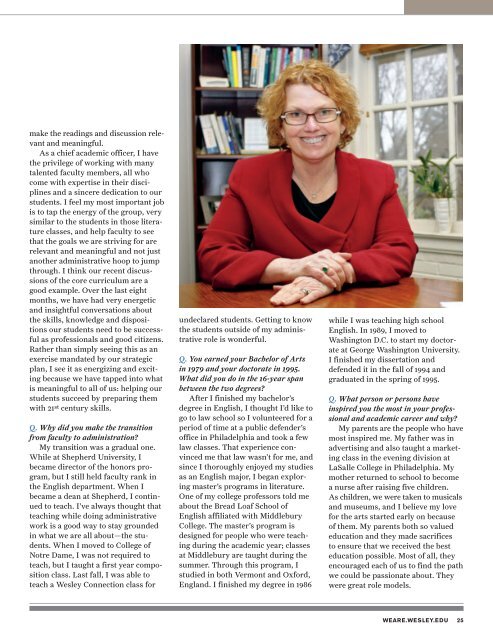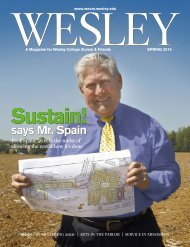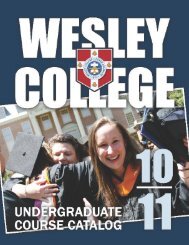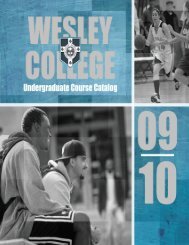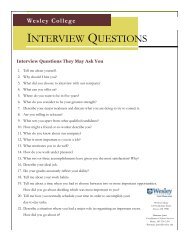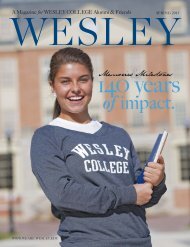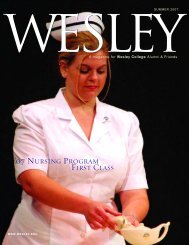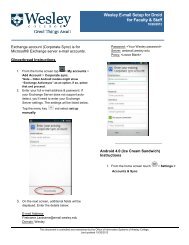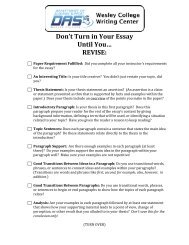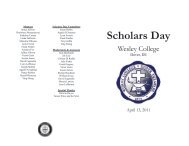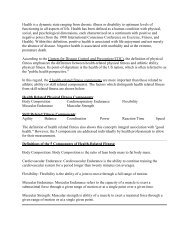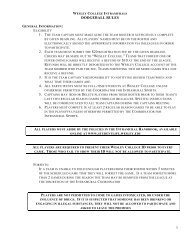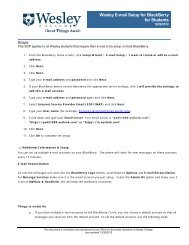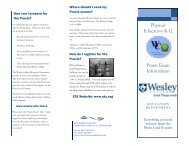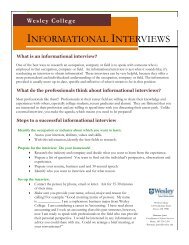WESLEY SPRING 2011 - Wesley Magazine - Wesley College
WESLEY SPRING 2011 - Wesley Magazine - Wesley College
WESLEY SPRING 2011 - Wesley Magazine - Wesley College
- No tags were found...
You also want an ePaper? Increase the reach of your titles
YUMPU automatically turns print PDFs into web optimized ePapers that Google loves.
make the readings and discussion relevantand meaningful.As a chief academic officer, I havethe privilege of working with manytalented faculty members, all whocome with expertise in their disciplinesand a sincere dedication to ourstudents. I feel my most important jobis to tap the energy of the group, verysimilar to the students in those literatureclasses, and help faculty to seethat the goals we are striving for arerelevant and meaningful and not justanother administrative hoop to jumpthrough. I think our recent discussionsof the core curriculum are agood example. Over the last eightmonths, we have had very energeticand insightful conversations aboutthe skills, knowledge and dispositionsour students need to be successfulas professionals and good citizens.Rather than simply seeing this as anexercise mandated by our strategicplan, I see it as energizing and excitingbecause we have tapped into whatis meaningful to all of us: helping ourstudents succeed by preparing themwith 21 st century skills.Q. Why did you make the transitionfrom faculty to administration?My transition was a gradual one.While at Shepherd University, Ibecame director of the honors program,but I still held faculty rank inthe English department. When Ibecame a dean at Shepherd, I continuedto teach. I’ve always thought thatteaching while doing administrativework is a good way to stay groundedin what we are all about—the students.When I moved to <strong>College</strong> ofNotre Dame, I was not required toteach, but I taught a first year compositionclass. Last fall, I was able toteach a <strong>Wesley</strong> Connection class forundeclared students. Getting to knowthe students outside of my administrativerole is wonderful.Q. You earned your Bachelor of Artsin 1979 and your doctorate in 1995.What did you do in the 16-year spanbetween the two degrees?After I finished my bachelor’sdegree in English, I thought I’d like togo to law school so I volunteered for aperiod of time at a public defender’soffice in Philadelphia and took a fewlaw classes. That experience convincedme that law wasn’t for me, andsince I thoroughly enjoyed my studiesas an English major, I began exploringmaster’s programs in literature.One of my college professors told meabout the Bread Loaf School ofEnglish affiliated with Middlebury<strong>College</strong>. The master’s program isdesigned for people who were teachingduring the academic year; classesat Middlebury are taught during thesummer. Through this program, Istudied in both Vermont and Oxford,England. I finished my degree in 1986while I was teaching high schoolEnglish. In 1989, I moved toWashington D.C. to start my doctorateat George Washington University.I finished my dissertation anddefended it in the fall of 1994 andgraduated in the spring of 1995.Q. What person or persons haveinspired you the most in your professionaland academic career and why?My parents are the people who havemost inspired me. My father was inadvertising and also taught a marketingclass in the evening division atLaSalle <strong>College</strong> in Philadelphia. Mymother returned to school to becomea nurse after raising five children.As children, we were taken to musicalsand museums, and I believe my lovefor the arts started early on becauseof them. My parents both so valuededucation and they made sacrificesto ensure that we received the besteducation possible. Most of all, theyencouraged each of us to find the pathwe could be passionate about. Theywere great role models.WEARE.<strong>WESLEY</strong>.EDU 25


